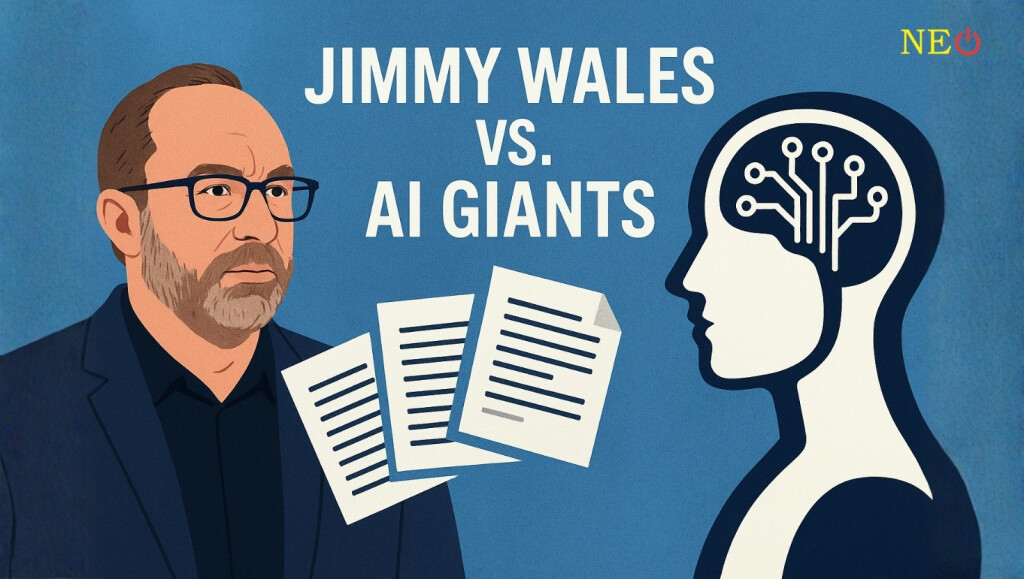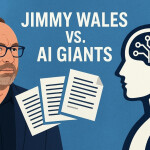Artificial intelligence models like ChatGPT, Gemini, and Claude have become the backbone of digital innovation — generating text, answering questions, and even summarizing knowledge across the web. But behind this technological brilliance lies a question that is now echoing louder than ever: Who owns the knowledge that fuels these AI systems?
Recently, Jimmy Wales, the co-founder of Wikipedia, voiced his concerns and issued a bold statement to major AI companies such as Google, OpenAI, and Anthropic — “If you’re training your AI on Wikipedia’s content, it’s time you start paying for it.”
This call from Wales opens up a new debate about fairness, sustainability, and the economics of knowledge in the AI era.
Table of contents [Show]
Why Jimmy Wales Is Taking a Stand
Wikipedia is not just another website — it’s one of the largest and most reliable repositories of human knowledge ever created. Its openly editable model, curated by millions of volunteers, has become a foundation for everything from search results to AI chatbots.
However, according to Wales, while AI developers heavily rely on Wikipedia’s massive database for training large language models (LLMs), they contribute nothing in return — not financially, not operationally.
Even though Wikipedia’s content is free under the Creative Commons license, Wales argues that the scale and commercial nature of AI companies’ usage make things different. These corporations are building billion-dollar products using data sourced from nonprofit platforms like Wikipedia — platforms that survive purely on donations.
“It’s not fair for donors to subsidize multi-billion-dollar companies,” Wales told Reuters, highlighting that AI bots crawling Wikipedia for training data consume real infrastructure, bandwidth, and moderation resources that cost money.
The Financial and Ethical Argument
Wikipedia’s servers process billions of page views each month. AI companies scrape and use these pages to train models capable of answering user queries — often replacing the need for people to visit Wikipedia itself.
That means AI systems benefit directly from Wikipedia’s quality and credibility, but the site bears the costs.
Wales emphasizes that this dynamic is not sustainable:
- The Wikimedia Foundation, which operates Wikipedia, depends on small donations from individual users.
- Meanwhile, companies like Google, Microsoft, and OpenAI are monetizing AI tools trained on this freely available content.
The co-founder believes that these companies should enter into enterprise-style licensing or contribution agreements, ensuring that Wikipedia receives compensation or infrastructure support for the massive value it provides.
The Bigger Picture: A Shift Toward Paid Data Access
Wales’ demand doesn’t come in isolation. Around the world, media outlets and content platforms are reassessing their relationships with AI companies.
- In 2023, The New York Times sued OpenAI and Microsoft, alleging unauthorized use of copyrighted materials for model training.
- Other organizations, including Reddit and Stack Overflow, have already started charging AI companies for data access via API licensing agreements.
In that light, Wales’ request seems less like a radical move and more like an inevitable evolution. If Wikipedia joins this trend, it could reshape the economics of open data and set a powerful precedent for other non-profit and educational platforms.
Balancing “Free Knowledge” with Fair Compensation
The central tension lies in Wikipedia’s mission — “to make knowledge freely accessible to everyone.” Asking for payment may seem contrary to that spirit. However, Wales clarifies that this is not about restricting public access, but about holding commercial entities accountable for the resources they consume.
Wikipedia’s Creative Commons license (CC BY-SA) allows free reuse of content with attribution, but it doesn’t forbid negotiated arrangements. Wales proposes that commercial-scale users — those who train models on the entire corpus — should share in the cost of maintaining it.
This idea introduces a new dimension to the debate:
Should “free” content remain free when it powers commercial products worth billions?
Wales argues that “free” should mean freely available to humanity, not free to exploit without contribution. That’s a significant philosophical shift — one that could redefine the open internet’s role in the AI revolution.
What It Means for AI Developers
If AI companies were to start compensating Wikipedia or similar platforms, it could trigger a chain reaction:
- Higher training costs – Companies would need to factor in licensing or data access fees.
- Ethical sourcing pressure – Models trained on paid and verifiable data could become more credible.
- More collaboration with data providers – Nonprofits and AI companies could partner to improve data quality and transparency.
Ultimately, this could lead to better AI models — ones that not only perform well but also respect the ecosystem that sustains their knowledge base.
The Future of Fair Data Usage
Wales’ statement comes at a time when global policymakers are already discussing AI regulation, data privacy, and copyright. Governments in the EU and the U.S. are exploring how to balance innovation with intellectual property rights.
By asking Big Tech to pay for Wikipedia’s contributions, Wales isn’t just seeking financial support — he’s advocating for a moral and sustainable framework for how the AI industry should treat open-source and community-driven content.
If AI is the brain of the future, then platforms like Wikipedia are the memory banks that feed it. Ignoring their upkeep could jeopardize the accuracy, fairness, and reliability of tomorrow’s AI tools.
Final Thoughts
Jimmy Wales’ message to the AI giants is a wake-up call for the digital era: free knowledge doesn’t mean free labor.
As AI models grow more powerful, the organizations that built the foundations of the internet deserve recognition — and fair compensation.
The future of AI might not just depend on smarter algorithms, but also on ethical partnerships between the tech titans that profit and the platforms that empower them.
Wikipedia’s call for payment could be the first step toward a more balanced, transparent, and sustainable AI ecosystem — one that honors the people and platforms that made knowledge truly open in the first place.









